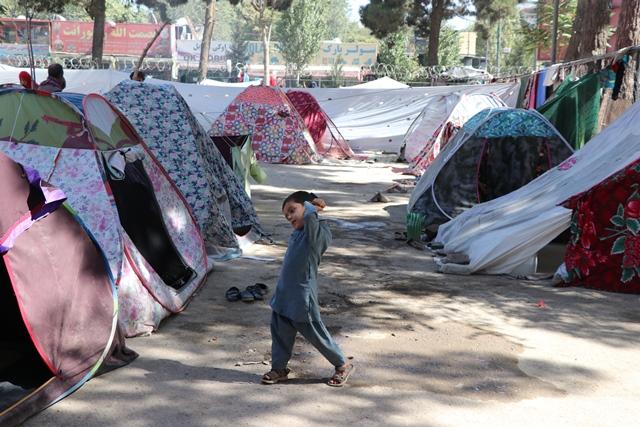KABUL (Pajhwok): Many internally displaced people (IDPs) in the Shahr-i-Naw Park of Kabul say they are unable to go back to their areas for want of money, urging the government to facilitate their return.
Prior to storming into Kabul, the Taliban gained the control of one province after another. As a result, thousands of people moved to main cities, especially Kabul.
Dozens of residents of northern provinces were displaced to the Sar-i-Kotal of Khairkhana, Shahr-i-Naw Park and some other parts of Kabul.
Pajhwok Afghan News interviewed several IDPs, most of whom citied economic problems, unemployment and lack of money for their inability to go back to their provinces.
Amanullah, a displaced person in the capital of Taloqan, told that he was forced to come to Kabul along with his family a month ago due to the fall of Takhar province to the Taliban. Earlier, he alleged, the previous government had bombarded their residential areas.
Zabihullah, displaced from Kunduz province along with six other family members, said dozens of households displaced from Takhar, Kunduz, Baghlan and Panjsher had to spend nights under tents.
The man complained he had not received any assistance from the government, businessmen or donor agencies.
He added all IDPs in Shahr-i-Naw Park had no money to return to their areas. He demanded action to pave the way for their return to their homes.
Mohammad Islam, a resident of the Pochawa valley in Panjsher, has a disability He fled to Kabul four days ago due to heavy fighting in the area.
He put the number of displaced families from Panjsher at 27, saying that they were currently without cash.
Safiullah, head of a donor agency, told Pajhwok since the beginning of the conflict between the Taliban and the previous government, they had been providing assistance to the displaced people.
He added until now, a large number of IDPs Sara-i-Shamali and Khairkhana areas had been provided financial and food assistance.
Saifullah revealed that the people posing as IDPs in some areas did not deserve support and were unwilling to return to their provinces.
Pajhwok tried to contact the relevant authorities for comment, but failed.
Sa







GET IN TOUCH
NEWSLETTER
SUGGEST A STORY
PAJHWOK MOBILE APP